Book contents
- The Cambridge Handbook of Lawyering in the Digital Age
- The Cambridge Handbook of Lawyering in the Digital Age
- Copyright page
- Contents
- Detailed Contents
- Figures
- Contributors
- Preface
- 1 Lawyering in the Digital Age
- Part I Effects of Technology on Legal Practice
- Part II Legal Tech and ADR
- Part III Legal Tech in Consumer Relations and Small Claims
- Part IV Legal Tech and Public Law
- Part V Legal Ethics and Societal Values Confront Technology
- 16 Ethics Guidelines for Trustworthy AI
- 17 Ethical Digital Lawyering
- 18 Law, Disintermediation and the Future of Trust
- Part VI Fate of the Legal Professions
18 - Law, Disintermediation and the Future of Trust
from Part V - Legal Ethics and Societal Values Confront Technology
Published online by Cambridge University Press: 18 November 2021
- The Cambridge Handbook of Lawyering in the Digital Age
- The Cambridge Handbook of Lawyering in the Digital Age
- Copyright page
- Contents
- Detailed Contents
- Figures
- Contributors
- Preface
- 1 Lawyering in the Digital Age
- Part I Effects of Technology on Legal Practice
- Part II Legal Tech and ADR
- Part III Legal Tech in Consumer Relations and Small Claims
- Part IV Legal Tech and Public Law
- Part V Legal Ethics and Societal Values Confront Technology
- 16 Ethics Guidelines for Trustworthy AI
- 17 Ethical Digital Lawyering
- 18 Law, Disintermediation and the Future of Trust
- Part VI Fate of the Legal Professions
Summary
In its 2020 survey, the Edelman Trust Barometer identified a paradox: ‘despite a strong global economy and near full employment, none of the four societal institutions that the study measures – government, business, NGOs and media – is trusted’.1 This is a rather grim sounding paradox. One can try to resolve it in a variety of ways. An obvious way would be to argue that when we measure trust, we are measuring a rather uninformative quantity. After all, trust can be considered good and a loss of trust would accordingly be bad only if and insofar as trust is placed in something or someone actually worthy of our trust. So, the true problem, one could argue, is not the loss of trust but the loss of trustworthiness – and this has not been measured.2 Whether trust is a good proxy for trustworthiness has yet to be established.
Keywords
- Type
- Chapter
- Information
- The Cambridge Handbook of Lawyering in the Digital Age , pp. 312 - 324Publisher: Cambridge University PressPrint publication year: 2021

